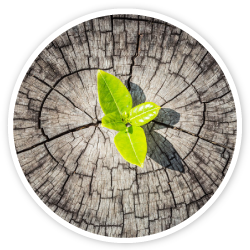During these unprecedented times, we are facing many challenges. I’ve put some ideas together from various sources to support my clients and interested others. While this is not advice specific to any particular person, I hope it resources you during this time of extreme challenges. Resources are included at the end of this article, and will be updated periodically.
My deepest wish is that some of these ideas will help you orient your psychological life and mental states to make good choices in meeting your current life situation.
The top 3 principles for coping (suggested on the basis of my training and work, especially in PTSD):
Stay as emotionally regulated as possible.
From this place, we are more likely to make better decisions and take effective action. (The amygdala in our emotional brain can hijack our thinking brain. Emotional regulation means being able to feel your feelings and to take effective action; not indulging or numbing our emotional or body experience.)
Look to what you can do, and what is good in your life, right now.
Gradually build on what you can do. Notice what is still available to you in spite of current changes. Cultivate agency and hardiness. (Fear narrows our mental field. Try to widen your mental scope. Glass half full.)
Stay connected to significant people
With family, friends, colleagues, people who resource and nourish you. Physical distancing is counteracted by meaningful and compassionate connection. (Research shows that social connections influence our physical functioning, longevity and psychological health.)
Key psychological challenges
Take a moment here. Write down for yourself 3 key challenges that are facing you currently due the COVID19 and its consequences.
Now, please consider whether the themes below resonate with you. What thoughts are sparking up for you as you read the table? What actions can you take, so you maintain mental states that are more positive and beneficial? The suggestions are just starting points.
| Possible challenges due to COVID19 | Potential negative inner states | Potential antidotes you could try |
| Not knowing how to cope in the face of uncertainty and changes in society |
|
|
| Fear and anxiety about the present and the future |
|
|
| Physical isolation
Social isolation |
|
|
| Information overload (news media and social media) |
|
|
| Collapsing into pessimism and depression |
|
|
| Disrupted routines and added responsibilities |
|
|
You know yourself better than anyone. What are you willing to try? Experiment with an antidote. Notice the effect. Did it help your mental state? If “Yes”, how can you cultivate this as a habit? If “No”, can you refine the antidote or try another one?
My teacher Dr Daniel P Brown (Associate professor at Harvard Medical School) suggested practicing gratitude, loving kindness meditation and living from purpose as antidotes (see the resource box on working with emotional states for the science). My clinical mentor Dr David Howsam (physician and EMDR consultant), suggested having a good exercise routine (yes, you can do it at home) and practicing inner stillness/calm as antidotes. Dr Kathy Steele (international trauma and dissociation expert), suggested structuring your day and shifting to a calmer pace. This Covid time is looking like a marathon, not a sprint.
From your own religious/spiritual faith, can you pray or act from a compassionate intention? Do you have skills in active social engagement to influence our leaders to act wisely?
Just like how you learnt to read and write, or drive a car … Remember we are all capable of learning new skills, which when cultivated become habits. And you know what they say … Behaviour done frequently becomes habit. Habits become character. Character becomes destiny.
It would be so easy to over-focus on danger and disruption right now. Yet we have the opportunity to do life differently. Imperfectly but worthwhile. What are some of the opportunities you have right now?
Without living in a Pollyanna world or denying the impact of what’s happening in our world, can this be a time where you:
- Spend more time in the comfort of your home?
- Connect with people you’ve been meaning to see for a long time?
- Plant that veggie garden or fix the house?
- Slow down, and reset your life to be more in line with your values?
- Work on your Plan B or Plan C?
Please remember that humans have survived many large scale disasters (war, famine, fires, natural disasters and other pandemics). Yes this one is different, but so were the others. Some people did suffer and die. Many of us will suffer and die. It is a sobering truth: we all die at some time. Possibly, what’s more important is how we live this one precious life.
And you know what? As long as you are alive, “Game not over”. Look for what’s still good in the world, and do what you can. Cultivate resilience (grit, determination, agency). May you be well and free from unnecessary suffering.
Resources
Working with our emotional states
- Resources form the Australian Psychological Society: Coping with anxiety and social isolation – https://www.psychology.org.au/COVID-19-Australians
- A 2 minute light video from Medecins sans frontiers (Doctors without borders) https://msf.org.au/covid19/mentalhealth
- Coping with worry and anxiety amidst global uncertainty (from Psychology Tools)
- What you can and cannot control during this time
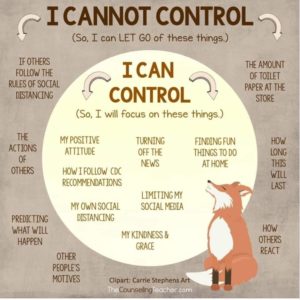
- Dr Russ Harris presents useful tips for how to FACE COVID https://www.youtube.com/watch?v=BmvNCdpHUYM&feature=youtu.be
- Barbara Fredrickson on how positive emotions are important (recorded in 2011)
https://www.youtube.com/watch?v=Z7dFDHzV36g
https://www.youtube.com/watch?v=hKggZhYwoys - Emotional regulation for kids
https://www.youtube.com/watch?v=H_O1brYwdSY - Cosmic Kids Yoga & mindfulness for emotional regulation
https://www.youtube.com/user/CosmicKidsYoga
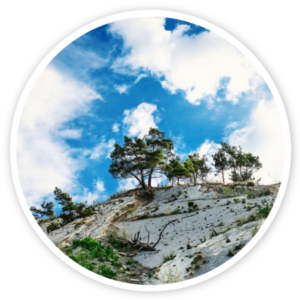 Cultivating inner strength and positive virtues
Cultivating inner strength and positive virtues
- Podcast on being resilient (inner strength) specifically in this pandemic. Rick Hanson is a clinical psychologist best known for his work on resilience and mental well being. It’s a light and informative conversation. Good neuropsychology applied to stress. There’s a good 5 minute calming meditation. Scroll down for the podcast.
www.rickhanson.net/being-resilient-during-coronavirus/ - Rick Hanson is hosting a resilience summit with 5 world experts. This first one is with Prof Elisa Epel from UCSF (co-author of The Telomere Effect with Prof Elizabeth Blackburn (Australian and Nobel prize winner). Very accessible and things we can do right now for physical and mental health. Plus additional resources.
https://www.rickhanson.net/resilience-summit/resilience-day-1/ If you like this, you can sign up for the rest of the summit (It’s free and on demand). - For podcasts and introduction to meditation, see https://mindonly.com/podcasts/ https://aboutmeditation.com/finding-equanimity-amid-uncertainty/
- For online courses on performance excellence, emotional growth and concentration meditation www.mindonly.comThese courses by Harvard Associate Professor Dr Daniel P. Brown are online versions of courses previously delivered to a range of professionals including physicians, judges and business executives.
 Now you have the kids at home …
Now you have the kids at home …
- Free Online Teaching Resources for Schools/Parents affected by School Closures
https://www.techlearning.com/resources/free-online-learning-resources-for-schools-affected-by-coronaviruscovid-19 - The Good Men Project – Great list of resources and sample daytime structure from homeschooling*
https://goodmenproject.com/featured-content/how-you-will-work-from-home-and-keep-your-kids-engaged-during-covid-19-kpkn/ - Free books via Audible https://stories.audible.com/start-listen
- Museums Victoria have introduced virtual tours: https://museumsvictoria.com.au/museum-at-home
- Anna Abramzon’s Free Art Lessons for Children and Adults
https://www.youtube.com/watch?v=WVnmXwPbrS8 - Handling Your Kid’s Disappointment When Everything Is Canceled https://www.nytimes.com/2020/03/18/parenting/coronavirus-kids-events-cancelled.html?referringSource=articleShare
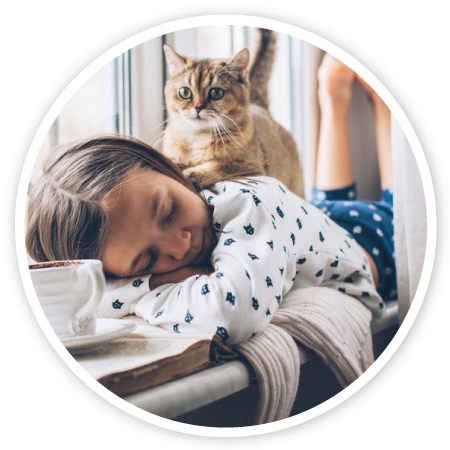 Now that you have more time at home …
Now that you have more time at home …
- Tips for Remaking Your Space While You’re Homebound
https://www.nytimes.com/2020/03/24/smarter-living/virus-remaking-space-while-homebound.html?referringSource=articleShare - There are almost 3,000 free courses from top universities including Harvard, Berkeley, MIT and University of Queensland. They range from IT, mental (e.g. emotional intelligence at work) physical health (e.g. back pain, Tai Chi) to law and language. Some of them offer certificates on completion https://www.edx.org/search
- The National Gallery of Victoria is offering virtual tours https://www.ngv.vic.gov.au/virtual-tours/
- The New York Metropolitan Museum is virtually open too https://www.metmuseum.org/
- Other world class museums and art activities https://www.travelandleisure.com/attractions/museums-galleries/museums-with-virtual-tours
- The Wheeler Centre (Books writing and ideas: podcasts and broadcasts: https://www.wheelercentre.com/broadcasts
- Free Online Classical Concerts
https://www.thestar.com.my/lifestyle/entertainment/2020/03/17/covid-19-world-famous-classical-music-venues-give-free-online-concerts
Disclaimer
This article and webpage is dedicated to supporting your wellbeing during the coronavirus outbreak. It is not offered as specific professional advice to any given individual. While I attempt to check the links provided here, I cannot vouch for each one as a recommendation; however, most of them have come via other therapists or professionals.
Acknowledgments
I’ve drawn on the work of my teacher Dr Daniel P. Brown (Harvard University; Dharma teacher and clinical psychologist; award winning author of Attachment Disturbances in Adults), and other researchers/trainers in the field of psychotherapy including Rick Hanson (Buddha’s brain, Resilience), Dr Richard Schwartz (Internal Family Systems), Dr Francine Shaprio (EMDR), my clinical mentor Dr David Howsam, and the Psychology, EMDR, IFS and Schema Therapy communities.
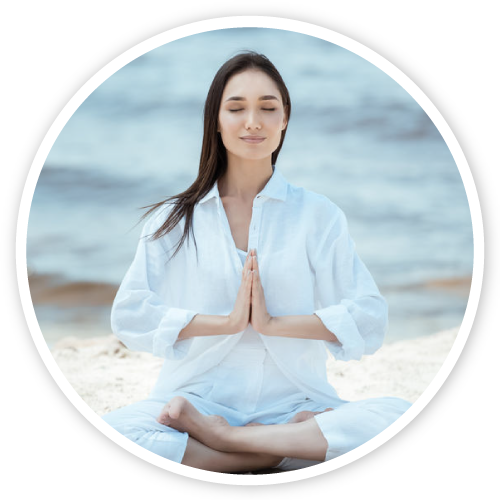 Buddhist philosophy informs my work and life, but you don’t have to be a buddhist to use the above suggestions. As the Buddha said: Check things out for yourself. Practice good self care. This is a good foundation to also care for others and our shared world.
Buddhist philosophy informs my work and life, but you don’t have to be a buddhist to use the above suggestions. As the Buddha said: Check things out for yourself. Practice good self care. This is a good foundation to also care for others and our shared world.
Apologies
It is beyond the scope of this webpage to address all psychological consequences of covid19, especially the complex ones. I hope you find compassionate, wise and skillful people to help you. Please seek professional assistance as required.
In Australia:
- Consult your GP in the first instance for a referral
- To find an Australian psychologit: The Australian Psychological Society Find a psychologist page http://www.psychology.org.au
- For an EMDR trauma therapist: http://www.emdraa.org
- For an IFS therapist: https://www.internalfamilysystemstrainingaustralia.com.au/directory/
- For a schema therapist: https://schematherapysociety.org/Find-a-Therapist
I’m sorry I won’t be able to speak or respond to everyone personally. I am in solo private practice and therefore have limited capacity to provide psychological consultations for everyone who shows interest. Currently, I am taking a short break to prepare for delivering Telehealth services (psychotherapy via phone or internet) and will resume private practice after Easter. Thank you for understanding. Please ring (03) 9592 2459 to check my availability.
 Dr Philomena Tan
Dr Philomena Tan

